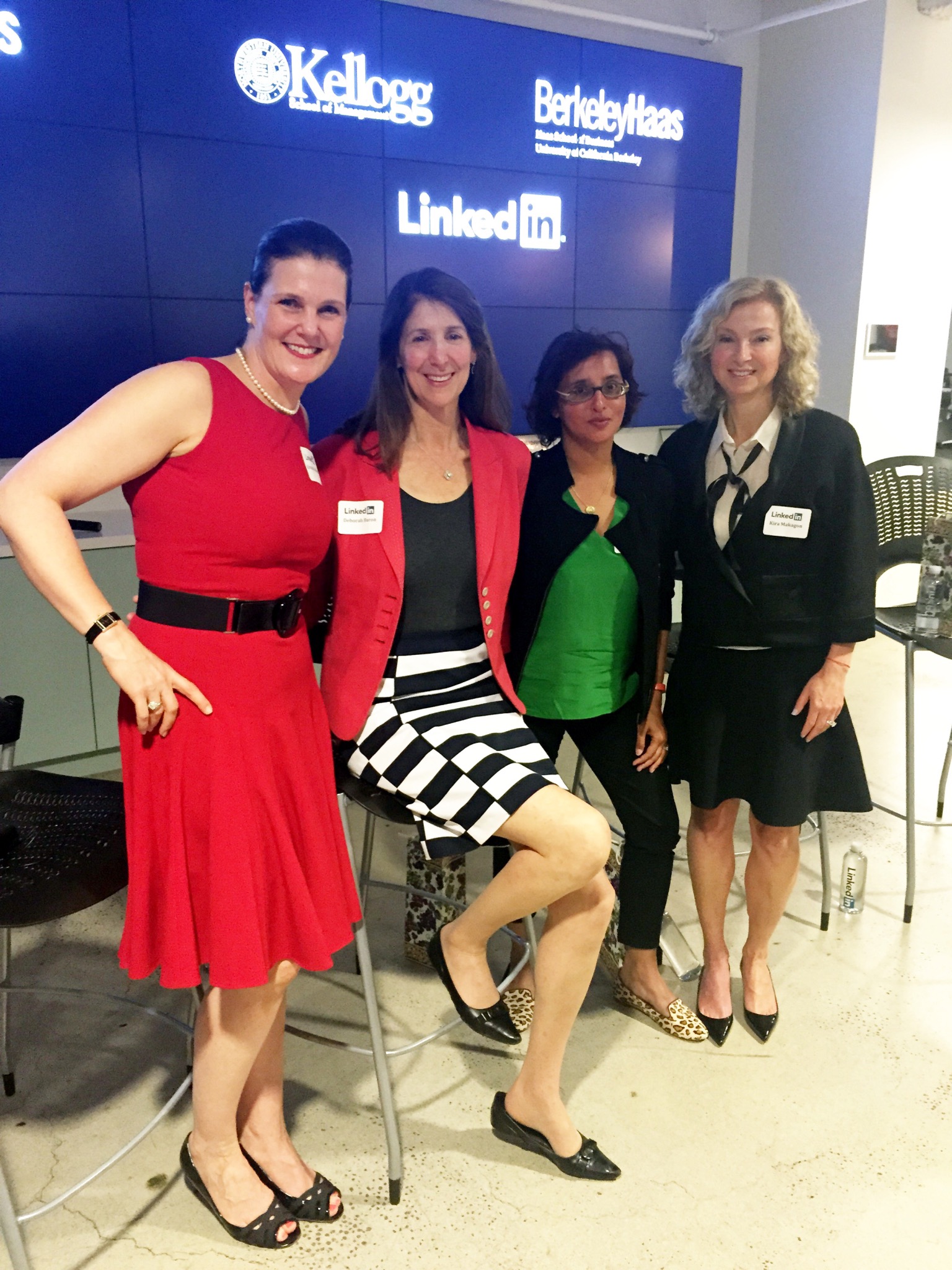This past Wednesday evening, I had the pleasure of moderating a panel of and for Kellogg and Haas business school alumnae Women in Technology hosted by LinkedIn. Especially because I know what it’s like to be in their shoes, I truly enjoy sharing my insights as a longtime technology leader with fellow women in technology. Often I refer to myself as “the veteran ‘only woman in the room,’” and, while that gets a lot of laughs, it remains far from funny that women continue to be so very underrepresented in technology leadership positions. When I have the opportunity to share my experiences with other women – especially when a panel and the room are full of women! — I jump at the chance in hopes that we will effect some change by having these terrific conversations and inspiring each other’s progress.
Panelists that evening included Kirsten Wolberg, Vice President of Technology Business Operations at PayPal; Deborah Baron, Chief Strategy Officer at Align Matters; and Kakul Srivastava, Chief Executive Officer of Project Sublime. Too many wonderful insights came out of our conversation to share in one blog post. No matter what questions arose, though, our conversations focused on how to show up in the workplace as a woman with an empowered voice and presence. Here is some advice from our panel:
Know that you have a right to be in the room, and claim that right. Kakul spoke of her early days in tech, wearing baggy clothes while on her college campus and feeling like she had to hide her femininity — and of the day she realized “hey, I can wear a dress and still be taken seriously!” But on the flip side, she worried about whether or not today’s “brogrammer” culture is once again chipping away at our ability to show up as the women we are. I chimed in that “imposter syndrome” – that feeling that you don’t have a right to be in the room – remains very real in tech. The consensus of the panel was summed up eloquently by Kakul, who, pointing to Kirsten’s bright red dress, exclaimed, “You should be here – you should be here in a bright red dress!”
Stand up and be heard. Kirsten, who’s tall, pointed out that often times women have to lower conference table seats in order to be able to sit with their feet flat on the floor, instantly diminishing their stature and making them look “low.” Sometimes, it’s not enough just to have a seat at the table! Kakul, who, like me, is less tall, indicated that she stands up when she speaks, assuming a power position. Deborah suggested that in addition to standing, women would benefit from prefacing comments and questions with their name to build personal reputation or brand. Asking smart questions that engage meeting participants or speakers helps them to remember you, too.
Never compromise your values. In response to a question from Haas alumna Anca Popovici, panelists shared values that they would never compromise. For Deborah, those values were credibility and integrity; for Kakul, community, internal and external truth, and passion. I suggested confidence. Focusing on staying true to your values in the workplace will help with your sure-footing at work and, ultimately, will help your advancement as people come to know you as someone with a strong sense of who you are and as someone who sticks to your principles.
Stay connected. How fitting to attend this event at LinkedIn, which offers the ultimate in business connection tools. In many ways, the theme of “you are not alone” came up in our conversations. Women are natural community builders. Networking is critical to keeping those connections alive whether for future job searches or for these important conversations about how to advance women in our field.
Don’t count men out. When PayPal holds an annual retreat for women, 20% of attendees are men, who, Kirsten added, finally get to feel what it’s like to be in the minority gender. Drawing men into the conversation, especially as they mentor women whom they are charged with bringing up through the ranks, is very important. Kakul agrees, adding “find men who get it.” The importance of partnership with men who consider women their equals, whether at home or at work, cannot be understated. Deborah added, “find common ground.” Many men have surprised all of us with their increasing attention to issues that have, for too long, been “women’s issues,” like work/life balance. I’ve written before of how I feel a gender-neutral approach is important in many different ways. If we are ever going to achieve anything near equal representation in tech leadership, it’s going to take perseverance and willingness to do things differently for both men and women. Let’s embrace the issue of the advancement of women as an issue for everyone in the workplace.
Coming away from this panel, I felt really good. These opportunities to gather, to share stories and experiences, and to network are invaluable to us and help us to see what we can all achieve when we help to elevate each other. Thank you to LinkedIn for hosting this beneficial experience.
Originally published Jun 23, 2015, updated Sep 17, 2021






